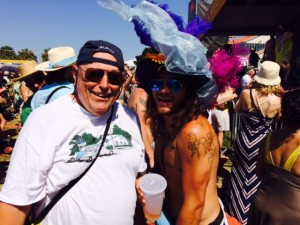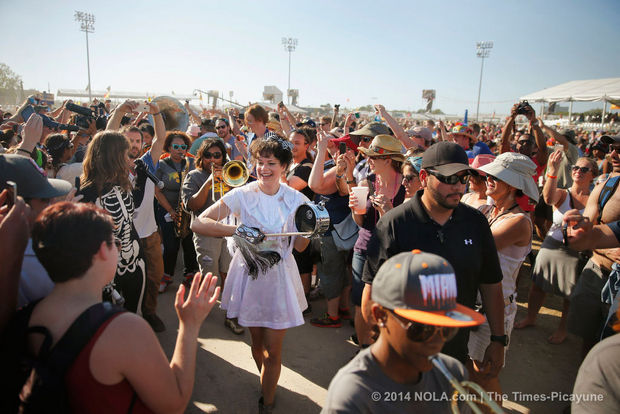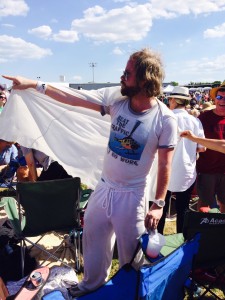
The New Orleans Jazz and Heritage Festival lineup is presented as a musical genealogy from roots to branches
Decades ago, a group of music lovers including Allison Miner, a transplant to New Orleans, put on the first New Orleans Jazz and Heritage Festival at a few open stages and a gospel tent in New Orleans’ Congo Square. The festival’s mission was to present the music and culture of New Orleans and surrounding areas, and to fulfill a quest that Miner, and she suspected others, were on, “for authenticity in a world that seemed increasingly manufactured.”

Gospel great Mahalia Jackson wasn’t even booked for the event but showed up to perform because she heard about it.
Forty-four years later, the New Orleans Jazz and Heritage festival has grown from a day-long event in the heart of the city to a sprawling 8-hour-a-day, 7-day, 12-stage, music, food, and cultural extravaganza at the Fair Grounds Race Course every early spring that attracts over half a million people.

At the most recent festival, which ended this past Sunday, I, Camille, spent four days crisscrossing the festival grounds with my father, Harry, who’s about to turn 80. Harry lives in the North East, but he’s been to the festival nearly thirty times. We saw everyone from a local supergroup, Gloriosky to Bruce Springsteen. We heard music from French gypsy jazz players, a Bahian samba band and gospel choirs that would take to the stage, thirty-strong. We stood in packed crowds to see Alabama Shakes and Arcade Fire, Aaron Neville and Allen Toussaint. We watched longtime festgoers, organized into krewes, follow their flags and spirit poles, and local neighborhood marching clubs, brass bands, Mardi Gras Indian tribes and Second Lines snake through the fair grounds. We ate etouffee, gumbo and a Gambian steak sandwich on a pita. And in our free moments, we scanned the crowd for the winner of our Wit T-shirt contest. (My pick was the stark: “I need an adult” on a lanky, bearded 20-something.)
So what does the Jazz Fest do for us?
The word “revel” has its origins in “rebel.” Revelry festivals, wrote the French author and intellectual George Bataille, offer a place and time of “a spectacular letting loose,” a rebelling against individuation, a blurring of distinction and differentiation, in which one temporarily attempts to regain a “lost intimacy” with the natural world. In fact, that’s just what anthropologists, Dr. Shana Walton and Helen A. Regis, and a team of researchers, gathering field notes at the New Orleans Jazz and Heritage Festival, have found.
“One way people create meaning in their lives is by doing things like ritually attending festivals,” says Walton.

Observing the rituals, customs and traditions of the Jazz and Heritage Festival fans of all ages, across all cultural demographics, Walton and Regis have documented weddings, memorial services, birth announcements, college reunions and family reunions. They’ve heard tales of festgoers discretely (and illegally) spreading the ashes of deceased loved ones on “holy” festival grounds. This year, a terminally ill man traveled from California to hold his own wake at a “pre-mortem party” between the two festival weekends.

As humans we seek moments of being outside of ourselves, says Walton. We need to feel as if we are part of something larger. What some refer to as a feeling of transcendence, transformation, even a spiritual experience at the festival—the arm-hair tingling, upward whoosh at a sight, a sound, an exchange—Walton says, others call a “Jazz Fest moment.”
And in turn, the festival organizers take this audience devotion seriously. Narrative stage sessions have been set up in which long-time festgoers are interviewed. These fest folk point to Jazz Fest as offering something they can’t get anyplace else. Walton reports that one krewe interviewed, made up of financial analysts, computer programmers, and teachers, said that they book their annual vacations at Jazz Fest, “because it is a place they can find ‘spirit’ and the ‘renewal’ they need to go back and work at their jobs for the rest of the year.”
In the Odyssey, Homer describes a particular kind of music-evoked emotion, a tapestry of wonder, dazzle, entrancement and enchantment. Nearly three thousand years later, on a patch of land down on the bayou, nothing’s changed.
Order “The Art of Doing” here. Signup for “The Art of Doing” free weekly e-newsletter. Follow us on Twitter. Join “The Art of Doing” Facebook Community. If you’ve read “The Art of Doing” please take a moment to leave a review here.
